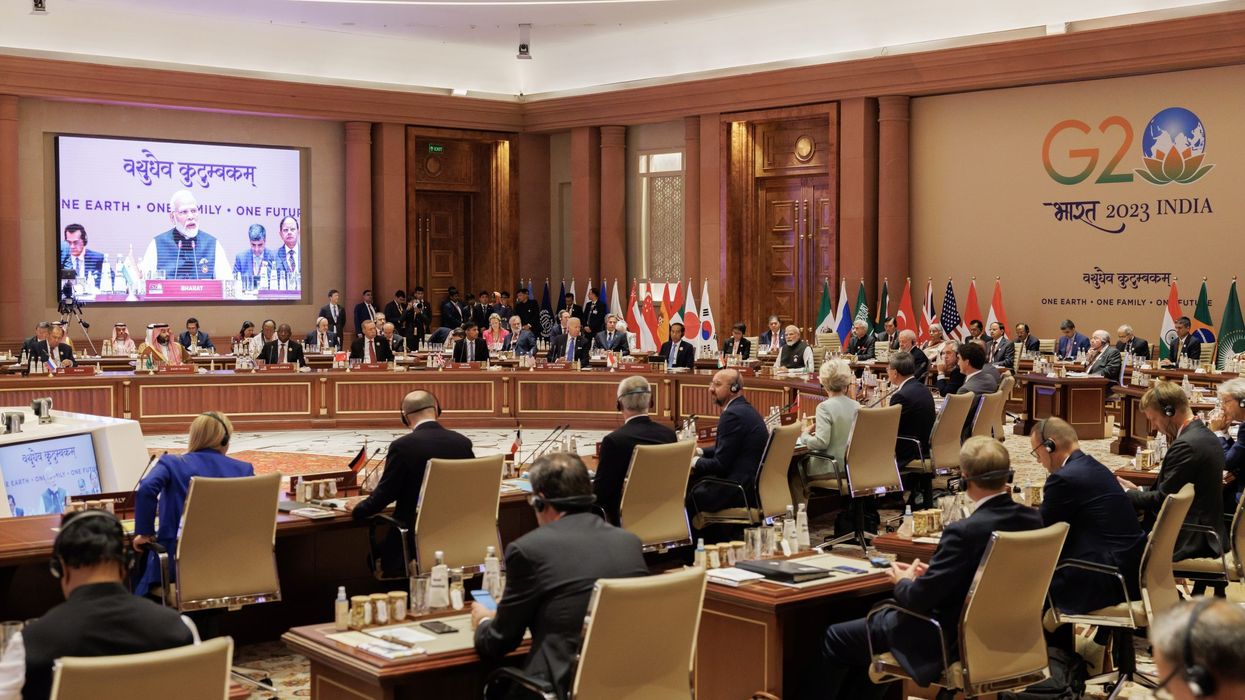During his G20 presidency, Narendra Modi strategically enhanced his domestic and international reputation as a guardian of national influence and well-being, emphasising India's global standing in anticipation of the upcoming general elections next year.
Over several months, the 72-year-old leader's presence has been pervasive throughout Delhi, as his image adorned numerous roadside posters and billboards that have been prominently displayed across India's capital city.
Among other slogans, they proclaimed the country the "Voice of the Global South".
India overtook China as the world's most populous country earlier this year, after displacing former coloniser Britain as its fifth-biggest economy in 2022.
Now Modi is seeking a place on the global stage to match, using the G20 summit as a catalyst to position India as a representative of many others outside traditional power blocs.
Among the most tangible outcomes of the summit was a permanent seat at the table for the African Union, and on the first day, Modi banged a ceremonial gavel to announce that the leaders had reached consensus to adopt a declaration.
It was somewhat unexpected. The grouping had agreed on most things last year in Bali but not all.
But by herding deeply divided leaders into a common -- if largely symbolic -- statement on vexed issues such as Russia's invasion of Ukraine, Modi scored a diplomatic win.
The statement avoided any direct criticism of Russia -- a long-time arms and energy supplier to India -- or summit absentee President Vladimir Putin, who is accused of war crimes by the International Criminal Court.
And on climate, there was no commitment to phase out fossil fuels, but there was backing for the goal of tripling renewable energy capacity by 2030.
"It is a success for India's diplomacy," said Ashok Kantha, former Indian ambassador to China.
"We could persuade our friends in the West, and say they need not insist on an explicit condemnation of Russia's invasion of Ukraine," he added.
"It's a good compromise."
And Michael Kugelman, director of the South Asia Institute at the Wilson Centre, said the outcome had "vindicated" India's policy of "strategic autonomy".
"It's definitely not a reflection of a 100 per cent consensus, or maybe not even an 80 or 90 per cent consensus," but it did "suggest a level of convergence on more issues than I had expected.
"That's a bit of a pleasant surprise."
- Symbolic scene -
Delhi went on an intense beautification drive before the two-day meeting.
Men were hired to chase away monkeys, some 70,000 flower pots were placed across the city and on summit days, swathes of the metropolis were locked down -- with some preparations criticised as thousands of homeless people were moved to shelters.
The summit's logo -- a globe with a lotus -- echoed the symbol of his Bharatiya Janata Party.
At the summit table, Modi sat behind a nameplate that said "Bharat" -- an ancient Sanskrit word steeped in religious symbolism -- rather than India.
He will go to the world's biggest election next year as the clear favourite, with the opposition Congress Party plagued by its reputation for corruption.
A recent poll by Pew showed eight in 10 Indians have a positive view of Modi, and almost as many believe he is leading the country to greater influence on the world stage.
His international reputation is a little less lustrous.
Under Modi's tenure, India has slumped in Freedom House's rankings for political rights and civil liberties, with police cracking down on protests, the ruling party scoring lavish funding from business allies and press freedoms curtailed.
Sweden's V-Dem Institute now describes the country as an "electoral autocracy" rather than a democracy.
But Kugelman said the G20 presidency "will really deliver a shot in the arm, so to speak, to his already very strong political prospects".
"He'll come out of this, I think, politically energised and certainly advantaged politically as well."
(AFP)




